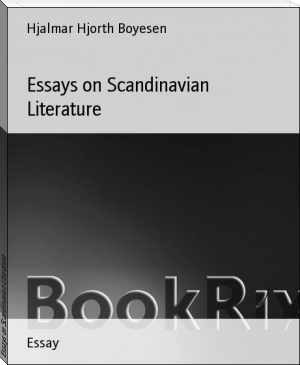Essays on Scandinavian Literature - Hjalmar Hjorth Boyesen (best books to read non fiction txt) 📗

- Author: Hjalmar Hjorth Boyesen
Book online «Essays on Scandinavian Literature - Hjalmar Hjorth Boyesen (best books to read non fiction txt) 📗». Author Hjalmar Hjorth Boyesen
PREFACE
Some twenty years ago the ambition seized me to write a History of Scandinavian Literature. I scarcely realized then what an enormous amount of reading would be required to equip me for this task. My studies naturally led me much beyond the scope of my original intention. There was a fascination in the work which lured me perpetually on, and made me explore with a constantly increasing zest the great literary personalities of Norway, Sweden, and Denmark. Thus my chapter on Henrik Ibsen grew into a book of three hundred and seventeen pages, which was published a year ago, and must be regarded as supplementary to the present volume. The chapter on Björnstjerne Björnson was in danger of expanding to similar proportions, and only the most heroic condensation saved it from challenging criticism as an independent work. As regards Norway and Denmark, I have endeavored to select all the weightiest and most representative names. The Swedish authors Johan Ludvig Runeberg, Mrs. Edgren, and August Strindberg, and the Dane Oehlenschlaeger, necessity has compelled me to reserve for a future volume.
COLUMBIA COLLEGE, NEW YORK,
February, 1895.
CONTENTS
BJÖRNSTJERNE BJÖRNSON
ALEXANDER KIELLAND
JONAS LIE
HANS CHRISTIAN ANDERSEN
CONTEMPORARY DANISH LITERATURE
GEORG BRANDES
ESAIAS TEGNÉR
BJÖRNSTJERNE BJÖRNSON
I
Björnstjerne Björnson is the first Norwegian poet who can in any sense be called national. The national genius, with its limitations as well as its virtues, has found its living embodiment in him. Whenever he opens his mouth it is as if the nation itself were speaking. If he writes a little song, hardly a year elapses before its phrases have passed into the common speech of the people; composers compete for the honor of interpreting it in simple, Norse-sounding melodies, which gradually work their way from the drawing-room to the kitchen, the street, and thence out over the wide fields and highlands of Norway. His tales, romances, and dramas express collectively the supreme result of the nation's experience, so that no one to-day can view Norwegian life or Norwegian history except through their medium. The bitterest opponent of the poet (for like every strong personality he has many enemies) is thus no less his debtor than his warmest admirer. His speech has stamped itself upon the very language and given it a new ring, a deeper resonance. His thought fills the air, and has become the unconscious property of all who have grown to manhood and womanhood since the day when his titanic form first loomed up on the horizon of the North. It is not only as their first and greatest poet that the Norsemen love and hate him, but also as a civilizer in the widest sense. But like Kadmus, in Greek myth, he has not only brought with him letters, but also the dragon-teeth of strife, which it is to be hoped will not sprout forth in armed men.
A man's ancestry and environment, no doubt, account in a superficial manner for his appearance and mental characteristics. Having the man, we are able to trace the germs of his being in the past of his race and his country; but, with all our science we have not yet acquired the ingenuity to predict the man--to deduce him _a priori_ from the tangle of determining causes which enveloped his birth. It seems beautifully appropriate in the Elder Edda that the god-descended hero Helge the Völsung should be born amid gloom and terror in a storm which shakes the house, while the Norns--the goddesses of fate--proclaim in the tempest his tempestuous career. Equally satisfactory it appears to have the modern champion of Norway--the typical modern Norseman--born on the bleak and wild Dovre Mountain,[1] where there is winter eight months of the year and cold weather during the remaining four. The parish of Kvikne, in Oesterdalen, where his father, the Reverend Peder Björnson, held a living, had a bad reputation on account of the unruly ferocity and brutal violence of the inhabitants. One of the Reverend Peder Björnson's recent predecessors never went into his pulpit, unarmed; and another fled for his life. The peasants were not slow in intimating to the new pastor that they meant to have him mind his own business and conform to the manners and customs of the parish; but there they reckoned without their host. The reverend gentleman made short work of the opposition. He enforced the new law of compulsory education without heeding its unpopularity; and when the champion fighter of the valley came as the peasants' spokesman to take him to task in summary fashion, he found himself, before he was aware of it, at the bottom of the stairs, where he picked himself up wonderingly and promptly took to his heels.
[1] December 8, 1832.
During the winter the snow reached up to the second-story windows of the parsonage; and the servants had to tunnel their way to the storehouse and the stables. The cold was so intense that the little Björnstjerne thought twice before touching a door knob, as his fingers were liable to stick to the metal. When he was six years old, however, his father was transferred to Romsdal, which is, indeed, a wild and grandly picturesque region; but far less desolate than Dovre. "It lies," says Björnson, "broad--bosomed between two confluent fjords, with a green mountain above, cataracts and homesteads on the opposite shore, waving meadows and activity in the bottom of the valley; and all the way out toward the ocean, mountains with headland upon headland running out into the fjord and a large farm upon each."
The feeling of terror, the crushing sense of guilt which Björnson has so strikingly portrayed in the first chapters of "In God's Way," were familiar to his own childhood. In every life, as in every race, the God of fear precedes the God of love. And in Northern Norway, where nature seems so tremendous and man so insignificant, no boy escapes these phantoms of dread which clutch him with icy fingers. But as a counterbalancing force in the young Björnson, we have his confidence in the strength and good sense of his gigantic father, who could thrash the strongest champion in the parish. He used to stand in the evening on the beach "and gaze at the play of the sunshine upon fjord and mountain, until he wept, as if he had done something wrong. Now he would suddenly stop in this or that valley, while running on skees, and stand spell-bound by its beauty and a longing which he could not comprehend, but which was so great that in the midst of the highest joy he was keenly conscious of a sense of confinement and sorrow."[2] "We catch a glimpse in these childish memories," says Mr. Nordahl Rolfsen, "of the remarkable character, we are about to depict: Being the son of a giant, he is ever ready to strike out with a heavy hand, when he thinks that anyone is encroaching upon what he deems the right. But this same pugnacious man, whom it is so hard to overcome, can be overwhelmed by an emotion and surrender himself to it with his whole being."
[2] Nordahl Rolfsen: Norske Digtere, pp. 450, 451.
At the age of twelve Björnson was sent to the Latin school at Molde, where, however, his progress was not encouraging. He was one of those thoroughly healthy and headstrong boys who are the despair of ambitious mothers, and whom fathers (when the futility of educational chastisement has been finally proved) are apt to regard with a resigned and half-humorous regret. His dislike of books was instinctive, hearty, and uncompromising. His strong, half-savage boy-nature could brook no restraints, and looked longingly homeward to the wide mountain plains, the foaming rivers where the trout leaped in the summer night, and the calm fjord where you might drift blissfully along, as it were, suspended in the midst of the vast, blue, ethereal space. And when the summer vacation came, with its glorious freedom and irresponsibility, he would roam at his own sweet will through forest and field, until hunger and fatigue forced him to return to his father's parsonage.
After several years of steadily unsuccessful study, Björnson at last passed the so-called _examen artium_, which admitted him to the University of Christiania. He was now a youth of large, almost athletic frame, with a handsome, striking face, and a pair of blue eyes which no one is apt to forget who has ever looked into them. There was a certain grand simplicity and _naïveté_ in his manner, and an exuberance of animal spirits which must have made him an object of curious interest among his town-bred fellow-students. But his University career was of brief duration. All the dimly fermenting powers of his rich nature were now beginning to clarify, the consciousness of his calling began to assert itself, and the demand for expression became imperative. His literary _début_ was an historic drama entitled "Valborg," which was accepted for representation by the directors of the Christiania Theatre, and procured for its author a free ticket to all theatrical performances; it was, however, never brought on the stage, as Björnson, having had his eyes opened to its defects, withdrew it of his own accord.
At this time the Norwegian stage was almost entirely in the hands of the Danes, and all the more prominent actors were of Danish birth. Theatrical managers drew freely on the dramatic treasures of Danish literature, and occasionally, to replenish the exchequer, reproduced a French comedy or farce, whose epigrammatic pith and vigor were more than half-spoiled in the translation. The drama was as yet an exotic in Norway; it had no root in the national soil, and could accordingly in no respect represent the nation's own struggles and aspirations. The critics themselves, no doubt, looked upon it merely as a form of amusement, a thing to be wondered and stared at, and to be dismissed from the mind as soon as the curtain dropped. Björnson, whose patriotic soul could not endure the thought of this abject foreign dependence, ascribed all the existing abuses to the predominance of the Danish element, and in a series of vehement articles attacked the Danish actors, managers, and all who were in any way responsible for the unworthy condition of the national stage. In return he reaped, as might have been expected, an abundant harvest of abuse, but the discussion he had provoked furnished food for reflection, and the rapid development of the Norwegian drama during the next decade is, no doubt, largely traceable to his influence.
The liberty for which he had yearned so long, Björnson found at the International Students' Reunion of 1856. Then the students of the Norwegian and Danish Universities met in Upsala, where they were received with grand festivities by their Swedish brethren. Here the poet caught the first glimpse of a greater and freer life than moved within the narrow horizon of the Norwegian capital. This gay and careless student-life, this cheerful abandonment of all the artificial shackles which burden one's feet in their daily walk through a bureaucratic society, the temporary freedom which allows one without offence to toast a prince and hug a count to one's bosom--all this had its influence upon Björnson's sensitive nature; it filled his soul with a happy intoxication and with confidence in his own strength. And having once tasted a life like this he could no more return to what he had left behind him.
The next winter we find him in Copenhagen, laboring with an intensity of creative ardor which he had





Comments (0)